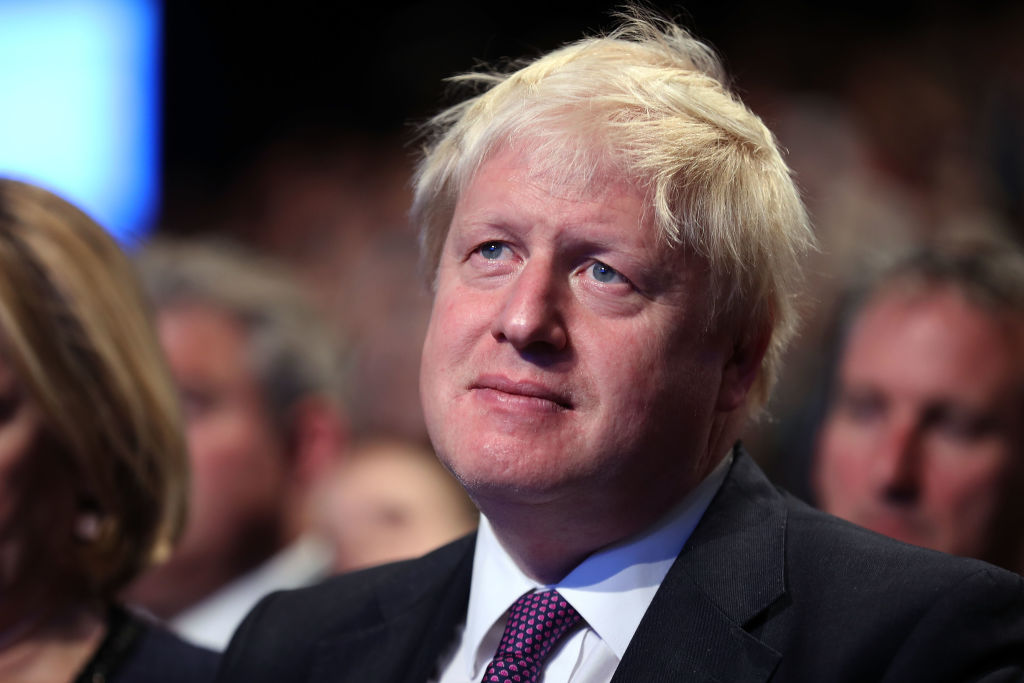In what kind of moral universe would it be considered acceptable for the authors of a war, the people who voted for a war, to get on their high horses over those who make daft or jokey comments about that war? For the people who green-lighted the bombing of a foreign nation to haughtily chastise those who dare to say silly things about the bloody consequences of that bombing? In the warped moral universe of political correctness, that’s where. This is the case of Boris Johnson and his thoughtless ‘dead bodies’ comment about Sirte, the Libyan city where Gaddafi was captured and executed in 2011. At the Conservative conference, Boris was asked about Libya. He talked about Sirte, and its potential, and said it could be ‘the next Dubai’, once they ‘clear the dead bodies away’. Oof. Cue squirming laughs from the audience and another round of hysterical BoJo-bashing in the media and among the Twitterati. Boris must go, the speech police say. It is intolerable to have a foreign secretary who says such ‘unbelievably crass, callous and cruel’ things, according to Emily Thornberry. Such comments would be ‘100 per cent unacceptable from anyone, let alone the foreign secretary’, said Tory MP Heidi Allen. Twitter is aflame with anti-Boris commentary. His words shame his office and Britain yada yada. It’s the usual stuff, the usual knee-jerk demand that someone be sent packing from public life simply for their poor choice of words, as if all of us — every one of us — do not make fools of ourselves with our jabber every day. But there is something different, something worse, in this latest outburst of censorious fury with ‘inappropriate’ words (‘inappropriate’ having replaced ‘blasphemous’ as the indicator of unacceptable speech). It is that some of the people railing against Boris voted for the 2011 bombing of Libya that helped to plunge that nation into mayhem. Which — get this — contributed to a situation in which those ‘dead bodies’ Boris mentioned could come about in the first place. There’s Sarah Wollaston, Tory MP, thrilling Labourites by daring to diss Boris. She said she was ‘appalled’ by his ‘demeaning jokes’ about ‘real people murdered in Libya’. She voted for military action in March 2011, when British, American and French planes assaulted Libya and contributed, as some of us predicted they would, to the unravelling of that nation and its consumption by instability and horror. She’s appalled by Boris’s words? Well, imagine how much more appalled those of us who believe in peace and the dignity of human life were by your casual ‘Aye’ to intervention in Libya. There’s Thornberry, beloved of Corbynistas — ‘Yass Queen’, they slavishly tweet every time she says something mildly amusing on TV — who ridiculed Boris’s ‘buffoonery’ and called him a ‘disgrace’. She voted for the action in Libya, too. Yes, this supposed peacenik, always railing against nukes, green-lighted the bombing of Libya. Yass Queen, drop those bombs. Anna Soubry says Boris should be sacked. She voted for the military intervention. Lib Dem deputy leader Jo Swinson slammed Boris as ‘unbelievably crass’. She voted for it too. You know who didn’t vote for it? Boris. He was London mayor at the time and not in parliament. And he actually cautioned against military intervention in Libya. He told politicians to cease their military ‘sabre rattling’ over this unstable nation. So, if you can fathom it, Boris is being attacked for the words he used about a disaster he cautioned against by people whose moral choices helped to bring that disaster about. This is a truly extraordinary state of affairs. We sometimes overlook, or forget, just how devastating that NATO action of March 2011 was. It set in motion a chain of destabilising events, including the emboldening of rebel groups (many of whom were far from ‘good guys’), the weakening of Libya’s state structures, and the eventual collapse of Gaddafi’s regime. Which you can cheer if you like — Gaddafi was a deeply unpleasant dictator — but without anything to replace him, the end result was mayhem: the splitting of Libya into at least three parts; the movement of vile radical Islamists, including Isis, into the post-intervention vacuum; death after death; a knock-on effect, in terms of refugees, weaponry and tensions, in other North African countries, including Tunisia and Mali; and, arguably, those ‘dead bodies’ in Sitre that Boris joked about. That the people who thoughtlessly okayed this process in Libya can now slam Boris for his words tells us everything we need to know about PC. It confirms the rank hypocrisy of so many PC speech policers. It shows that PC reduces everything, even war and destruction, to matters of correct language. It reveals that our PC era is so linguistically myopic, so feverishly obsessed with the surface of things and the terms we use, that what some people say about a conflict zone seems to outrage us more than the small matter of how that conflict zone came into being. PC chases out all moral depth and seriousness in favour of instructing us all: ‘You can’t say that.’ Virtue-signalling MPs, you’re disgusted by what Boris said about dead people? Okay. But I’m more disgusted by the moral choice you made in parliament six years ago, without which those people might not be dead.
 Brendan O’Neill
Brendan O’Neill
Boris Johnson’s ‘dead bodies’ critics should take a look in the mirror






Comments